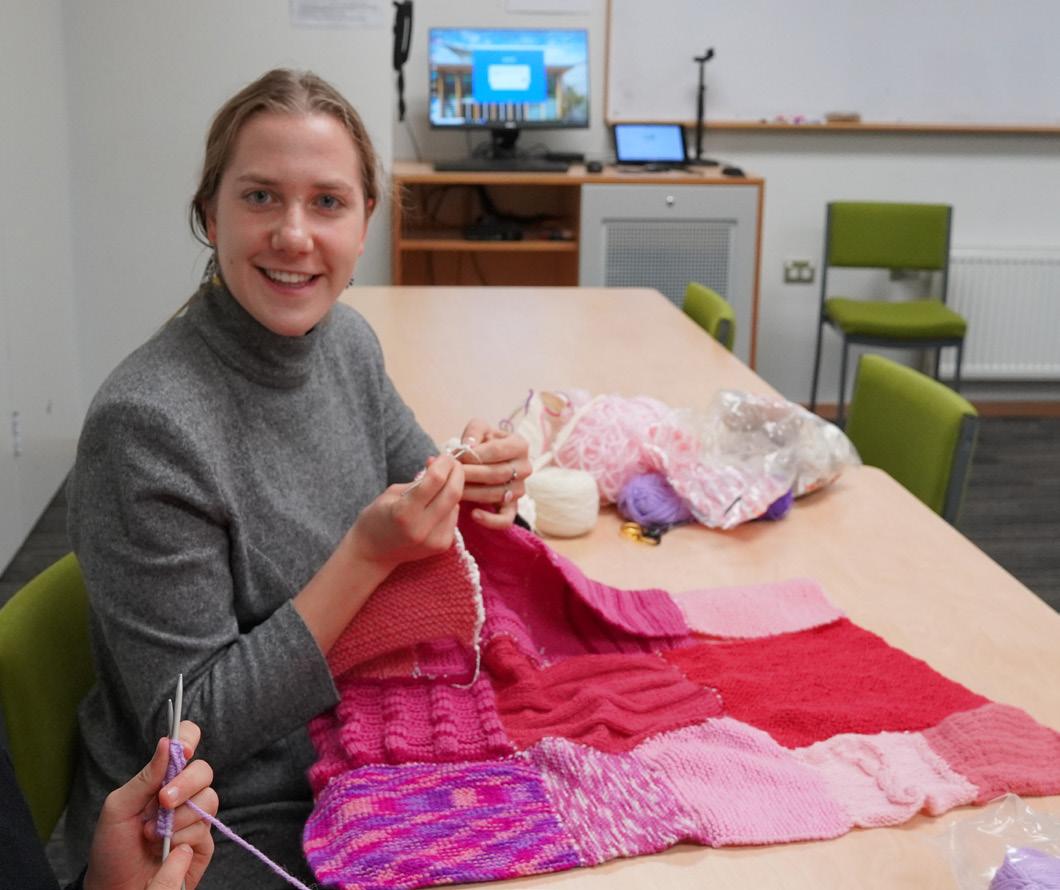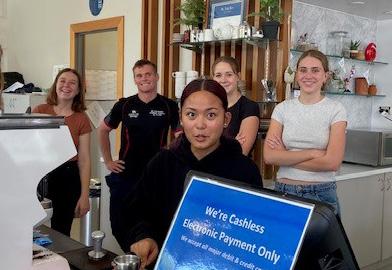Te Aka Tauira
Issue 3
Inside:
> Knitting with a purpose
> Physio students get hands-on
> Disco soup!

Ki Kia ora!

Inside:
> Knitting with a purpose
> Physio students get hands-on
> Disco soup!

Ki Kia ora!
> Asking Toloa recipients: What is your why?



Kia ora!
It’s getting busy huh!
I hope you all got some time off from writing essays and doing assignments over the Easter break to relax, recover and get ready for the second part of semester.
It’s getting colder in Dunedin, and I can only imagine your lives are getting busier as course works picks up, and study starts to feel very real once again. Now is the time to make sure you’re taking care of yourselves. Make sure you keep warm, eat proper meals, and don’t let yourself get too far behind! It’s harder to catch up than to keep on top of your work.
I’m sure you’ve all heard now the University’s announcement of the beginning of a voluntary redundancy scheme. Rest assured, no matter what happens, you will be able to complete your study! OUSA is working with the University and government to ensure that any disruption has as minimal impact on students as possible. If you’re concerned, you can always reach out to any of the OUSA team with your worries.
If you are struggling, pop in and see our amazing OUSA student support team on Ethel Benjamin place, they’re here to help in every way you can imagine. Every week Critic publishes a fun, easy recipe if you’re struggling for inspiration too!
> Burn baby burn, disco... soup?
> Injured? Student physios with hands-on experience

> Knitting with a purpose: Blankets for nicu babies made with love
OUSA’s wonderful Administrative Vice President Imogen has started holding weekly drop-in session in the link from 11am –1pm. This is your chance to come and talk about literally anything! If uni’s got you down, life is hard, you think OUSA sucks or you just want to talk about your cat then this is the time to come and let us know your thoughts. There’s even an anonymous feedback box, you can say anything.
Our annual Hyde street party is coming up next month, and capping show is well under way too. Make sure you check out our social media for all the ticketing details, you don’t want to miss out.
> Keeping healthy this winter
Āperira whakaahua
Ngā mihi, Quintin
PS. If you ever can’t find space in the library, come use the OUSA office! There’s usually a free seat.
Also, you may have heard, the university is engaging in a review of the languages and culture program. If you have any concerns or questions about this, OUSA will be hosting a drop in Hui at 11am on April 5th. We’ll use this to inform our submissions to the university. We’re here

Here are some handy Te Reo Māori phrases to have in your back pocket to celebrate the māmā in your whānau.
E kore e mimiti taku aroha mōu
My love for you will never wane
Ki a koe e Mā me te aroha nui

To mum with love, nā (tō ingoa)- from (your name)


Me kore ake koe
We are so lucky to have you
Ko koe taku oranga
You are my rock
Siosi’ana Narawa, fourth year BHealSc student majoring in Pacific and Global Health:

“My why is my family. As an immigrant from Fiji, it was difficult for my parents to reestablish their lives abroad and start from square one. I do this for them because they gave up their lives back home to create more opportunities for my siblings and me to succeed at university. Hopefully, the future will be something I can give back to them to show their sacrifices were not for nothing.”

This year, ten Pacific tauira recieved the Toloa Tertiary Scholarship, the highest number of Otago students to recieve the award in one year. The Ministry for Pacific Peoples says that the scholarship aims to support Pacific tauira engagement with STEAM (Science, Technology, Engineering, Arts and Maths).



“My grandparents, like many who migrated from the Islands, left their homes in search of a better future for their families. Despite their significant contributions to Aotearoa, their efforts have been undervalued for many years. The health disparities we still see today are a direct result of the stress and trauma of the past. I am determined to rebuild the trust and give back to my people and show them that they are appreci-
Maia Dean, third year BSc student majoring in Physics, minoring in Mathematics:
“I come from a family of teachers, entrepreneurs and scientists and they have shaped me to be who I am today. I’ve always had a curiosity about how and why the world works the way it does. My passion for the physical sciences stems from my dad and grandad, who introduced me to the idea of space travel from my earliest memory. To my young mind, there was no difference in our ancestors traversing the ocean using stars and our descendants traversing space using the same stars.”
“I chose to study Human Nutrition because I am interested in the relationship between food and health. Growing up I have witnessed and experienced the challenges in accessing healthy and culturally appropriate food due to varying factors that lead to consequential health disparities within my community and family such as diabetes and other chronic diseases.”


A pair of Otago University student sisters are putting in the mahi to raise awareness about food waste and its impacts on the climate crisis.

For the past eight years, the Slow Food Network has organised annual Disco Soup Days across the globe, with the intention of demonstrating the size of the world’s food waste problem.
“Disco soup is a soup made from perfectly good, nutritious food, which would otherwise have been thrown away.”
Zoe, who is studying a BSc in Physics and Environment and Society runs Slow Food Youth Otago with her sister Yuna, who is also studying a BSc in Physics, with a minor in Geography.

Zoe and Yuna run Slow Food Youth Otago along with their executive committee: Vice-president Supriya Sally, BSc Food Science and Entrepre neurship, Secretary Mary Jane Grove, BSc Environ mental Management, and Social Media Manager Jasmine Prince, Bachelor of Dental Surgery.
The sisters ran a Disco Soup event in the Link, on Friday 28 April.
According to The World Counts, a project which aims to raise awareness of “critical global challenges”, a third of all food produced globally is wasted, amounting to 1.3 billion tonnes a year.
The Slow Food Network says food waste is one of these critical challenges and solving it could be an important tool in efforts to stop the climate crisis.
“This quantity of food waste is such an issue, because it means that a third of the energy intensive processes it takes to grow and distribute food, alongside packaging and storing, occur for absolutely no reason,” says Zoe.
The World Counts says food waste happens at several different points on the journey from field to table, and while some of this food isn’t edible - such as crops affected by disease or food which is spoiled due to “ineffective harvesting or storing”- at least 35% of food waste is perfectly edible.
This perfectly edible food is discarded by supermarkets and households, often without being opened.
According to the UN Food and Agriculture Organisation this is happening in a world in which 3.1 billion people globally have limited access to healthy food, and over 800 million people per year go hungry.
Zoe says that projects such as Disco Soup Day help to draw attention to the fact that alongside working to limit food waste, the food which is being wasted can be repurposed, redistributed and eaten by those in need.





For student physiotherapists, six weeks of hands-on clinical experience is a total “game changer ”, says Nathalie Chua.
Nathalie, Joseph Devlin, TJ Zimba and Gareth Ward-Allen are tauira in the fourth, and final, year of their physiotherapy studies at the University of Otago.
They have recently completed six weeks of clinical placement in the Dunedin campus clinic, Te Whare Makatea Kura.
Nathalie explains that she has always wanted to be a physiotherapist, as her mum suffered with rheumatoid arthritis, and she saw the way that physiotherapy helped her to manage her condition.
“I want to help people manage their pain, and also help to empower them as well.”
Joe has slightly different motivations, he loves both sport and science and was looking for a profession which fit somewhere in between those interests.
“We treat patients under the close supervision of our supervisors, who are available to step in if we come across something we feel like we can’t handle,” he explains.
The Dunedin clinic is open to kaima hi, tauira and the general public.
The clinic provides management of back and neck pain, sports, gym and work inju ries, balance, dizziness and con cussion presentations and post-surgical recovery.
Those accessing the clinic can choose whether they want to be assessed and treated by students under the supervision of a fully qualified physiotherapist or be seen by one of the registered physiotherapists who work at the clinic.
“One of the benefits to seeing a student, alongside helping their studies, is the price. It’s only $35 rather than $75 (or $15 rather than $30 for ACC visits),” says Nathalie.
The supervisors, Margaret Campbell and Ashleigh Taylor, are experts in the field of physiotherapy, with a collective 39 years of clinical experience.
The Dunedin physiotherapy clinic uses a combination of two approaches, called collaborative management.
“Collaborative management combines active participation like at-home exercises, with manual techniques in modern, bright Dunedin clinic as providing the perfect space for this kind of combined approach to

”
“ It’s such a practical profession. Fully hands-on and independent. That’s what attracted me to it.




Pēpī in Dunedin Hospital’s neonatal intensive care unit (NICU) are some of the smallest and most vulnerable members of our community, and Otago University’s medical and pharmacy students are helping with their care in an unusual way.
Te Whatu Ora Southern has 16 cots in its NICU, which serves Southland and Otago babies who are born prematurely, or who need intensive care in their first three months of life.
Information from The Little Miracles Trust, a charity which supports whānau through their neonatal journey, explains that tiny babies have trouble regulating their temperature, and 100% wool knitted blankets can really help to keep them warm so that their body can focus on growing and developing.
“In contrast shop bought items made from acrylic or other synthetic fabrics can trap moisture and cause babies to cool down, rather than staying warm and dry.”
For a decade, groups of medical students at Otago have been coming together once a week to create beautiful handmade blankets for the babies in the NICU.
This endeavour began in 2013 when then vice-president of the Otago University Medical Students’ Association, Rosie Grant, decided to combine her love of knitting with her medical education in order to “give back to the Dunedin community in a meaningful way”.

The knitting club is still going strong with roughly 30 medical and pharmacy students turning up each week to kōrero, share kai, and knit together.
Kay, a third-year medical student who attends each week wants to go into paediatrics eventually, because she loves babies and children.
“Knitting these blankets feels like a way to provide care for those who need it, before I am fully qualified to provide medical care, this is helping in a holistic sense.”
It’s also important to note that the act of knitting can have mental, emotional, and physical benefits for the knitter, says The Little Miracle Trust.
“Knitting can help to manage stress and anxiety, it can help with motor skills, and it is a meditative act that helps with relaxation.” Eva, a third-year medical student, who is a keen crochet-er, says she has found the group beneficial as a calm break from an otherwise very strenuous course.
“I’ve made friends, introduced new people to knitting and crochet, and crucially, I’ve been able to give my brain a break.
“It feels good to make things with a purpose, and an added bonus is that it saves my closet from filling up with crochet items I don’t have a use for.”
Many of the knitters describe the weekly meeting as a chance to rest, take a break from their studies and catch up with their peers.
Members also commonly say that as well as having social and emotional benefits for them personally and as a group, they feel they are making a contribution to their community by helping vulnerable pēpī and whānau who need support.
Anastasia, a third-year medical student and one of this year’s group leaders, says she often feels her creativity has to take the back burner during her degree, as the mahi is so intellectually strenuous, so finding a creative outlet with a purpose has been excellent.
If you are an avid knitter and want to make something for the NICU please see the The Little Miracles Trust guidelines here, for the article about Rosie Grant in 2013 click here, and for free neonatal knitting patterns click here.
Immunisation is the best protection against flu this winter – and it is free!
If you are living in a college pop along to free walk-in clinics (no bookings required) at Student Health Mon-Thu 5pm-7pm OR
Any students can go to any of multiple free walk-in vaccination clinics at the Dental School (310 Great King St) between 11:30am and 1:30pm on May 3, 4, 9, 11, 17, 18, 23, 25, 31 & June 1. Did you know?
Flu germs can living on hands and surfaces for 24 hours
Tips to stop the flu spread:
•Wash your hands often with warm water and soap
•Use tissues to trap germs when you cough or sneeze
•Bin used tissues quick!
•Stay at home if you are unwell
Tips to help your immune system help you:
•Get enough sleep
•Eat healthy food
•Cut down on vaping + smoking
•Keep the drinking sensible


Entries for Bulletin Photo Competition close on Friday, 12 May.
This annual photo competition is open to University staff and students. The top 12 entries will be shared in a series of ‘photo of the month’ posts across Otago’s social channels.

So if you’ve got that epic shot (or three!), now’s the time to send it in. Scenic shots, international destinations, animals, insects, life in New Zealand, people – we want to see it all! And if you’re looking for inspiration, have a look at last year’s winning entries.
Check out the competition details here.
Want to see your pics in next month’s photo dump? Send them to: communications@otago.ac.nz









